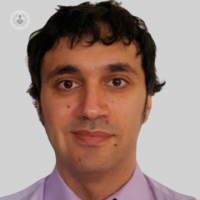What are the emotional and behavioural effects of a stroke?
Written by:Recently, studies have suggested that COVID-19 could increase the risk of stroke in some people.

We decided to catch up with Dr Daniel Ghossain to discuss the different types of strokes and how they can affect patients on an emotional and behavioural level. We also discussed how patients are assessed and the type of therapy that can be offered as treatment.
In what way can a person change after a stroke?
Well, a person can change in numerous different ways. Stroke can:
- affect cognitive functioning, such as a person’s memory and attention skills
- cause language disorders
- cause loss of motor functioning and sensation
A stroke happens because of a disruption of blood supply to the brain. This can be:
- due to ischaemia (lack of supply) - an artery carrying blood to the brain becomes blocked (i.e. by a blood clot or a bleed), restricting blood supply to the brain.
- due to a haemorrhage - a blood vessel bursts, causing bleeding into the brain.
The long-term effects of strokes depend on the type and location of the stroke, but as with all brain injuries, every person's presentation and recovery is individual. The effects largely depend on where the blood supply to the brain is restricted.
Anterior Cerebral Artery (ACA) Stroke
Presentation after an ACA stroke can be varied but it often affects a range of skills referred to as executive functioning skills: planning and organisation, mental flexibility, our ability to sustain attention and control our impulses. An ACA stroke can also cause disorders of voluntary movement (e.g. dyspraxia).
Middle Cerebral Artery (MCA) Stroke
An MCA stroke affects the brain’s temporal lobes, which is the most important part of the brain for memory. An MCA stroke can also result in language impairment (dysphasia), deficits in attention and perception, and hemiplegia or hemiparesis (weakness or the inability to move one side of the body).
Posterior Cerebral artery (PCA) Stroke
A Posterior Cerebral Artery (MCA stroke) can result in disorders of visual and perceptual processing.
A stroke can affect people’s personality, particularly if the frontal lobes and limbic system of the brain are affected by it.
Are these changes permanent?
Yes and no. It depends on the type of stroke and the individual brain to recover. A person may recover completely, partially or barely recover at all. This depends on the person’s age, previous history of stroke, severity of damage to the brain and the individual’s ability to compensate for the loss of function. Most people are likely to see the most improvement in the first few weeks of recovery. If functioning hasn’t spontaneously resolved within a couple of years of the stroke, then it’s unlikely to happen to after. People who are older find it harder to recover especially if they have had previous symptoms of stroke.
In what ways do you help your patients? (treatments, services, etc.)
Assessment
People who have a stroke are usually given a short assessment of their cognitive functioning called a screening, either in a hospital or not long after their stroke. If symptoms of the stroke persist, they can have a longer more in-depth cognitive assessment further down the line, as it's often easier to reach conclusions during the post-acute stage. Further assessments can be carried out over the long term to monitor a person’s progress. As well as assessing cognitive functioning, the person’s psychological functioning is also assessed for symptoms of low mood, depression, anxiety, etc.
Treatment
Treatment is bespoke because each injury is unique to the individual. Based on the outcome of the assessment, a rehabilitation programme based on the needs of the individual is provided, involving interventions to help with cognitive functioning (e.g. compensatory strategies for memory loss) and mood (e.g. psychological therapies). To be more effective, treatment may involve providing external support, such as training and supervision of family members and professionals like support workers and rehabilitation assistants.
How can this affect the patient’s family and what can you offer them?
Brain injury or stroke does not just affect the patient but their nearest and dearest. A stroke can contribute to caregiver strain, psychological distress in family and friends, and financial pressures. If the patient has children, it can affect their ability to care for them. A stroke can also lead to changes in family dynamics between the person who has the stroke and their partners and children.
The person who was previously the breadwinner can become dependent as a result of the stroke. This can give rise to ambiguity in the roles of spouses or partners as they may have to adapt from being an intimate partner to being a caregiver.
Caregivers are more likely to be depressed if the stroke survivor is and vice versa. Couples affected by acquired brain injury or stroke can experience relationship and sexual difficulties as sexual libido can be affected. There is an increased incidence of divorce in relationships affected by stroke.
As well as treatment for patients, I provide support to families to reduce caregiver strain and burden. I provide family therapy as well as educational support for families.
Can therapy be provided via a remote appointment?
Psychological therapy can be provided over an e-Consultation. Online communication does affect the therapy client dynamic in some ways, but if that is the preference of the client, then it can still be an effective way of providing therapy. It is more difficult, however, to provide cognitive rehabilitation via remote appointments as this involves the need to observe the individual functioning in their living or working environment.
For the very best therapy and cognitive rehabilitation, we recommend booking an appointment with a highly experienced clinical psychologist such as Dr Daniel Ghossain . Click here to visit his profile today.


